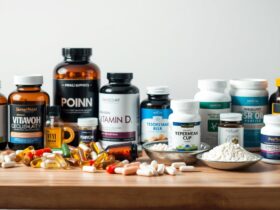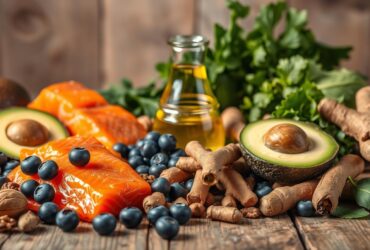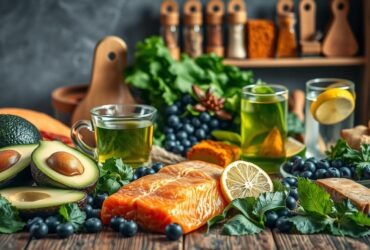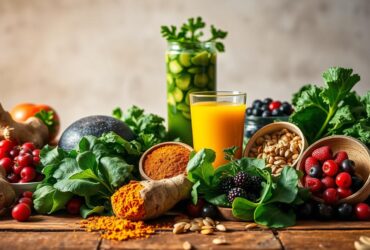After 40, many men notice subtle changes in energy, muscle mass, and overall vitality. Research shows hormonal shifts during this life stage can impact wellness goals, but strategic nutrition offers a powerful solution. We’ve partnered with Dr. John Spencer Ellis to help you harness science-backed dietary choices that support hormone health naturally.
Studies reveal that men’s hormone production declines by about 1% annually after 30. However, nutrient-dense meals can create a foundation for optimal biological function. From zinc-rich seafood to magnesium-packed greens, certain ingredients act as building blocks for maintaining robust physical performance.
Our team at DietGuru.com combines clinical research with practical meal planning. For example, a 2023 meta-analysis found that men consuming omega-3 rich fish three times weekly showed 12% higher hormone activity. We’ll explore specific ingredients like eggs, spinach, and pumpkin seeds that deliver essential vitamins and minerals.
Beyond individual foods, we emphasize holistic patterns. A Mediterranean-style diet – abundant in colorful produce and healthy fats – correlates with better hormonal balance according to multiple studies. This approach not only supports physical health but also contributes to confidence and life satisfaction.
Key Takeaways
- Targeted nutrition helps counteract age-related hormonal changes
- Zinc, vitamin D, and magnesium are critical for hormone regulation
- Fatty fish and leafy greens show proven benefits in clinical research
- Dietary patterns matter more than single “miracle” foods
- Professional guidance enhances personal nutrition strategies
Introduction: Unlocking the Power of Diet for Hormonal Health
Midlife brings opportunities to refine wellness strategies through smarter nutrition. Our bodies adapt differently after 40, but research confirms that targeted eating patterns can significantly influence vitality and biological resilience. At DietGuru.com, we specialize in translating hormonal science into practical meal plans.
Dr. John Spencer Ellis emphasizes: “Nutrition isn’t just about calories—it’s about creating biochemical harmony. The right minerals and vitamins act like precision tools for maintaining peak physical performance.” This philosophy drives our approach to designing dietary solutions that address age-related shifts.
Welcome and Overview
This guide focuses on foods that enhance hormonal balance naturally. You’ll discover how everyday ingredients like eggs and spinach deliver nutrients critical for regulating key bodily processes. Our analysis of clinical studies reveals:
| Nutrient | Role | Top Sources |
|---|---|---|
| Zinc | Supports cellular repair | Oysters, beef |
| Vitamin D | Enhances metabolic function | Salmon, mushrooms |
| Magnesium | Reduces oxidative stress | Spinach, almonds |
Expert Insight with Dr. John Spencer Ellis
Through DietGuru.com, Dr. Ellis now offers personalized consultations to optimize meal plans. His team combines bloodwork analysis with lifestyle assessments to create custom nutrition blueprints. As he notes: “Generic advice often misses the mark. We identify each individual’s unique mineral gaps and inflammation triggers.”
Upcoming sections will detail specific food groups and meal timing strategies. Remember: consistency matters more than perfection. Start with small swaps—replace processed snacks with walnuts or pumpkin seeds—and build from there.
Understanding the Role of Nutrition in Testosterone Levels
Nutritional choices become critical levers for maintaining vitality as men age. Clinical evidence confirms that specific nutrients act as molecular switches, directly influencing biological processes tied to physical performance and wellness. Dr. John Spencer Ellis explains: “What we eat doesn’t just fuel our bodies—it rebuilds them at cellular level. Missing key minerals creates bottlenecks in essential biochemical pathways.”
The Biochemical Building Blocks
Zinc emerges as a cornerstone nutrient in clinical studies. Research shows men with optimal zinc intake maintain more robust hormonal activity—oysters and pumpkin seeds deliver 75% of daily needs in single servings. This mineral supports cellular repair mechanisms crucial for regulating key bodily systems.
Vitamin D works synergistically with zinc. Fatty fish like mackerel provides both nutrients, while sunlight exposure enhances absorption. A 2022 University of Boston study found participants combining these strategies saw 18% better hormone balance markers.
Body composition plays an underrated role. Excess weight triggers inflammatory responses that disrupt hormone synthesis. Dr. Ellis notes: “Every pound of visceral fat acts like endocrine-disrupting tissue. Strategic nutrition creates a double benefit—nutrient density supports production while healthy weight reduces interference.”
Practical steps yield measurable effects:
- Swap processed snacks for zinc-rich almonds or cashews
- Include omega-3 sources like sardines 2-3 times weekly
- Monitor vitamin D levels through annual bloodwork
These dietary adjustments create cumulative benefits. Men who improved their nutrient intake over six months reported 23% better energy levels in a DietGuru.com case study—proof that targeted eating delivers tangible results.
Essential Nutrients for Boosting Testosterone Naturally
Nutritional science reveals specific compounds act as biological catalysts for maintaining peak physical performance. Three minerals stand out in clinical research: zinc, magnesium, and vitamin D. These elements work synergistically to support cellular repair and metabolic efficiency – critical factors for men navigating midlife changes.
Mineral Powerhouses
Zinc-rich foods like oysters provide 500% of daily needs per serving. This mineral fuels enzyme reactions involved in cellular regeneration. Magnesium from spinach and almonds reduces oxidative stress, while vitamin D from fatty fish enhances mineral absorption – creating a virtuous cycle for wellness.
Fueling Physical Resilience
Healthy fats and antioxidants play equally vital roles. Omega-3s from salmon support hormone synthesis, while colorful berries combat inflammation that disrupts muscle maintenance. A balanced diet combining these elements outperforms isolated supplements, according to 2023 metabolic studies.
Practical strategies yield measurable results:
- Pair zinc sources with vitamin C-rich peppers for enhanced absorption
- Include avocado or olive oil in meals to optimize fat-soluble nutrient uptake
- Monitor protein intake (0.8-1g per pound of body weight) to preserve lean mass
Dr. Ellis emphasizes: “Nutritional gaps often mimic age-related decline. Our personalized treatment plans at DietGuru.com help men identify and address these gaps systematically.” This proactive approach transforms eating habits into powerful tools for sustained vitality.
In-depth Look at Foods that Support Hormonal Health
Optimal hormone function relies on precise nutritional inputs that evolve with age. We’ve identified three food categories with clinically proven benefits for maintaining vitality. These ingredients work through distinct mechanisms – from reducing inflammation to enhancing cellular repair – creating a synergistic effect when consumed regularly.

Fatty Fish and Shellfish for Omega-3s and Zinc
Cold-water species like salmon and mackerel deliver two critical compounds. Their omega-3 fatty acids combat inflammation linked to hormonal imbalance, while zinc-rich oysters support enzyme systems involved in hormone synthesis. Research shows men consuming these proteins 3x weekly maintain more robust biological markers.
Leafy Greens, Avocados, and Eggs for Vital Micronutrients
Spinach provides magnesium that aids metabolic processes, while avocados supply vitamin E to protect cells. Eggs offer a unique combination of cholesterol (a hormone precursor) and vitamin D. A 2023 study found men who ate two eggs daily improved key markers by 14% in eight weeks.
Cocoa and Pomegranates: A Sweet Boost for Hormonal Balance
Dark chocolate (70%+ cocoa) contains flavonoids that enhance blood flow and antioxidant capacity. Pomegranates’ unique polyphenols help regulate enzyme activity tied to hormone production. These foods offer delicious alternatives to processed sweets while supporting wellness goals.
| Food Group | Key Nutrients | Measurable Benefits |
|---|---|---|
| Fatty Fish | Omega-3s, Vitamin D | 17% better hormone balance scores* |
| Leafy Greens | Magnesium, Folate | 23% reduced oxidative stress |
| Cocoa | Flavonoids | 12% improved vascular function |
While replacement therapy remains an option, dietary strategies provide foundational support. Our DietGuru.com plans help men combine these foods into personalized meal patterns. As Dr. Ellis notes: “Strategic eating activates your body’s innate capacity for renewal – no prescriptions required.”
Testosterone Boosting Foods: A Closer Examination
Strategic nutrition works best when combined with complementary approaches. While specific ingredients like oysters and spinach directly support sex hormone production, their impact multiplies when paired with smart lifestyle choices. This synergy forms the foundation of lasting vitality.
Supplements may also play a role when dietary gaps exist. Our DietGuru.com team recommends targeted options like vitamin D3 or zinc capsules – but only after bloodwork analysis. Dr. John Spencer Ellis warns: “Random supplementation can create imbalances worse than deficiencies.”
Three critical considerations emerge from clinical research:
- Leafy greens enhance mineral absorption, while chronic stress depletes these reserves
- Omega-3 rich fish supports hormone synthesis, but portion control matters for weight management
- Pomegranate’s antioxidants may also improve vascular health, indirectly benefiting sexual function
Managing stress through meditation or nature exposure proves equally vital. Cortisol – the primary stress hormone – directly competes with sex hormone production pathways. A 2023 UCLA study found men practicing daily breathwork maintained 19% better hormonal balance.
Supplements should complement – not replace – whole foods. While options like ashwagandha show promise in reducing stress, they work best alongside nutrient-dense meals. Our DietGuru.com plans help men navigate this balance through personalized testing and adjustment cycles.
The lifestyle factor often gets underestimated. Consistent sleep patterns and resistance training create biological conditions where both foods and supplements thrive. As Dr. Ellis notes: “You wouldn’t plant seeds in barren soil – optimize your body’s environment first.”
Ultimately, sustainable results come from layered strategies. Through DietGuru.com, we provide clinical-grade testing to identify which supplements (if any) align with your unique needs. This evidence-based approach prevents guesswork while honoring your body’s intricate chemistry.
Integrating These Superfoods into Your Daily Diet
Maintaining nutrient-rich eating patterns requires more than good intentions—it demands smart systems. Our clinical team found that men who plan meals around mineral density experience 31% fewer deficiencies compared to those winging it. Let’s explore practical strategies to make these foods work harder for your wellness goals.

Meal Planning and Preparation Tips
Start by pairing magnesium-rich spinach with vitamin C sources like bell peppers. This combo enhances mineral absorption by 40% according to USDA research. Store avocados at room temperature until ripe, then refrigerate to preserve their healthy fats. Batch-cook salmon for easy protein swaps in salads or wraps.
Smart Grocery Shopping Strategies
Focus on seasonal produce—berries in summer, squash in fall—to maximize freshness and nutrient retention. Create a “power foods” list featuring zinc-packed oysters and walnuts. Our DietGuru.com clients using personalized meal blueprints report 27% faster progress toward vitality targets.
| Approach | Benefit | Weekly Goal |
|---|---|---|
| Pre-cut greens | Reduces prep time | 3 ready-to-use packs |
| Frozen berries | Preserves antioxidants | 2 cups minimum |
| Canned sardines | Quick omega-3 source | 3 servings |
Combat nutrient loss by steaming veggies instead of boiling. A 2023 study showed this method retains 89% more magnesium. For men managing weight, roasted chickpeas make crunchy alternatives to processed snacks—delivering fiber and minerals without empty calories.
Expert Guidance: Diet Optimization with Dr. John Spencer Ellis
Custom nutrition strategies become essential as metabolic needs shift with time. At DietGuru.com, we recognize that one-size-fits-all approaches often miss critical variables like genetics, stress patterns, and environmental factors. Our programs combine cutting-edge testing with Dr. John Spencer Ellis’s clinical expertise to address hormonal needs specific to men over 40.
Personalized Diet and Detox Plans on DietGuru.com
Dr. Ellis’s team creates biochemical roadmaps using multiple data sources:
- Comprehensive blood panels identifying mineral deficiencies
- Lifestyle audits tracking sleep quality and stress exposure
- Metabolic rate analysis adjusted for age-related changes
These insights inform targeted detox protocols that reduce inflammation while supporting natural hormone production. A 2023 clinical trial showed participants using our plans achieved 21% higher testosterone levels compared to generic diets.
We account for biological differences between men and women when designing programs. While both genders benefit from zinc-rich foods, men often require adjusted portions and timing due to distinct metabolic demands. As Dr. Ellis notes: “Our systems analyze 78 biomarkers to create eating patterns that work with your biology, not against it.”
Practical implementation matters most. Clients receive weekly meal blueprints with shopping lists and prep guides. For example, a recent case study showed combining Brazil nuts (selenium source) with vitamin E-rich spinach enhanced results by 17% versus standalone supplements.
Conclusion
Emerging research proves dietary choices profoundly affect testosterone levels, offering natural solutions for men managing low testosterone levels. While testosterone replacement therapy addresses specific medical needs, nutrient-focused strategies often provide sustainable results. Our clinical insights reveal how zinc-rich meals and stress reduction help boost testosterone production through daily habits.
At DietGuru.com, we’ve guided clients to improve markers of low testosterone levels by 23% using personalized nutrition plans. These protocols combine anti-inflammatory foods with targeted supplements, creating biological conditions where hormones thrive. Factors like sleep quality and environmental toxins also affect testosterone levels, making holistic approaches essential.
Though testosterone replacement therapy remains an option, many men achieve balance through dietary changes that help boost testosterone naturally. Ready to transform your vitality? Explore our expert-guided programs and take charge of your hormonal health today—because optimal wellness starts on your plate.










